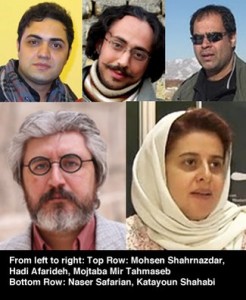The Six Imprisoned Iranian Filmmakers
by Caitlyn Christensen / October 5, 2011 / 2 Comments
BBC says no one works for their service inside Iran, “formally or informally.” BBC has acquired the broadcast rights of works by the arrested filmmakers, who have also been screened “in festivals and other venues internationally.”
Days before the documentary aired, the pro-government Young Journalists’ Club (YJC) issued a statement to IRNA, Iran’s state news agency, saying that the arrest of a “BBC secret network” was forthcoming.
“Several famous individuals, masquerading as artists, who have had extensive secret cooperation with the BBC Persian Service were identified and the necessary judicial actions will be taken with regard to them over the coming days,” the statement said.
The BBC’s signal was disrupted during the documentary’s broadcast inside Iran, and the arrests occurred one day after the film aired.
Human Rights House of Iran identified five of the filmmakers as Mojtaba Mirtahmasbi, Nasser Saffarian, Mohsen Shahrnazdar, Hadi Afarideh, and Katayoun Shahabi. The sixth, according to opposition web sites, is Mehrdad Zahedian.
Sampsonia Way compiled brief overviews and filmographies of the directors.
Iran seized Mojtaba Mirtahmasbi’s passport, papers and computer on September 8 as he attempted to board a flight to Paris to promote the French release of This is Not a Film. He was barred from leaving the country.
Mirtahmasbi co-directed This is Not a Film with Jafar Panahi. The documentary depicts a day in Panahi’s life while appealing his conviction for “propaganda against the system”. In December 2010, Panahi was sentenced to six years in prison, barred from traveling abroad and banned from making films for 20 years. He was charged while in the progress of making a film about Ahmadinejad’s disputed 2009 re-election and the following protests.
Panahi submitted This is Not a Film to the Cannes International Film Festival on a USB device baked into a cake. Mirtahmasbi attended Cannes, and was en route to the Toronto Film Festival when his documents were seized.
Watch a clip of This Is Not a Film
Nasser Saffarian directed a three-part documentary on Forough Farrokhzad, an Iranian filmmaker and one of Iran’s most influential contemporary poets. The Cold (2003) analyzes Farrokhzad’s personal life, The Mirror of the Soul (2000) investigates her controversial erotic poetry, and Summit of the Wave (2004) overviews her film work.
Watch a clip of The Mirror of the Soul:
Mohsen Shahrnazdar released his first documentary in April 2011. From No. 37, is a film about Sedagh Hedayet, contemporary Iran’s most famous fiction writer. Hedayet’s stories are widely translated, but still banned in Iran.
Watch a clip of From No. 37:
Hadi Afarideh’s extensive filmography includes short films as well as documentaries. The Memory of Niavaran examines the Shah’s overtaking of Niavaran, the palace of the last Persian king, following the Islamic Revolution in 1979.
A comprehensive list of his films can be viewed on Afarideh’s website.
Film producer Katayoun Shahabi regularly attends the International Film Festival Rotterdam. In 2011 she was a Juror for the Network for the Promotion of Asian Cinema , which selected The Day I Disappeared and Black Blood as the festival’s best Asian films. The Day I Disappeared is based on the filmmaker’s own flight from Iran.
In 2008, Mehrdad Zahedian’s Unfenced Square won Best Short Documentary at Iran’s Cinema Vérité Festival. In 2007, his film The Lost Ring was one of four Iranian films shown at the Aljazeera International Documentary Film Festival. He also directed a series of films celebrating Iranian architecture, including one on the city of Shiraz and the Bam Citadel.
Iranian President Mahmoud Ahmadinejad appeared before the United Nations General Assembly on September 22 and gave a long list of what he sees as the West’s crimes against the rest of the world. He gave no mention of his government’s human rights violations. American diplomats walked out of the Assembly.






2 Comments on "The Six Imprisoned Iranian Filmmakers"
I wish to register my opposition to the treatment of these filmmakers and call for their release and vindication. The Iranian authorities’ behaviour, as described, is outrageous and to be condemned.
Trackbacks for this post